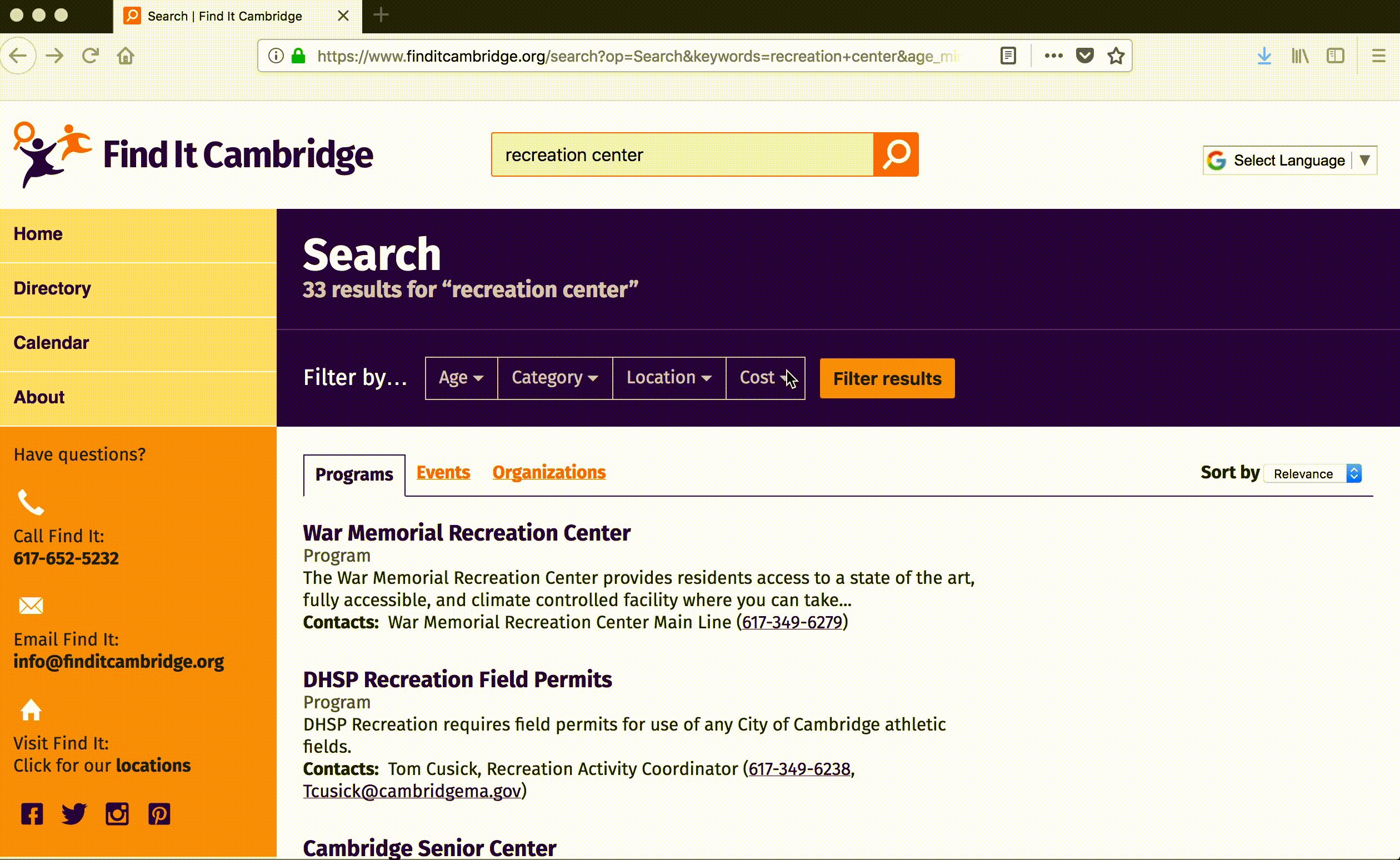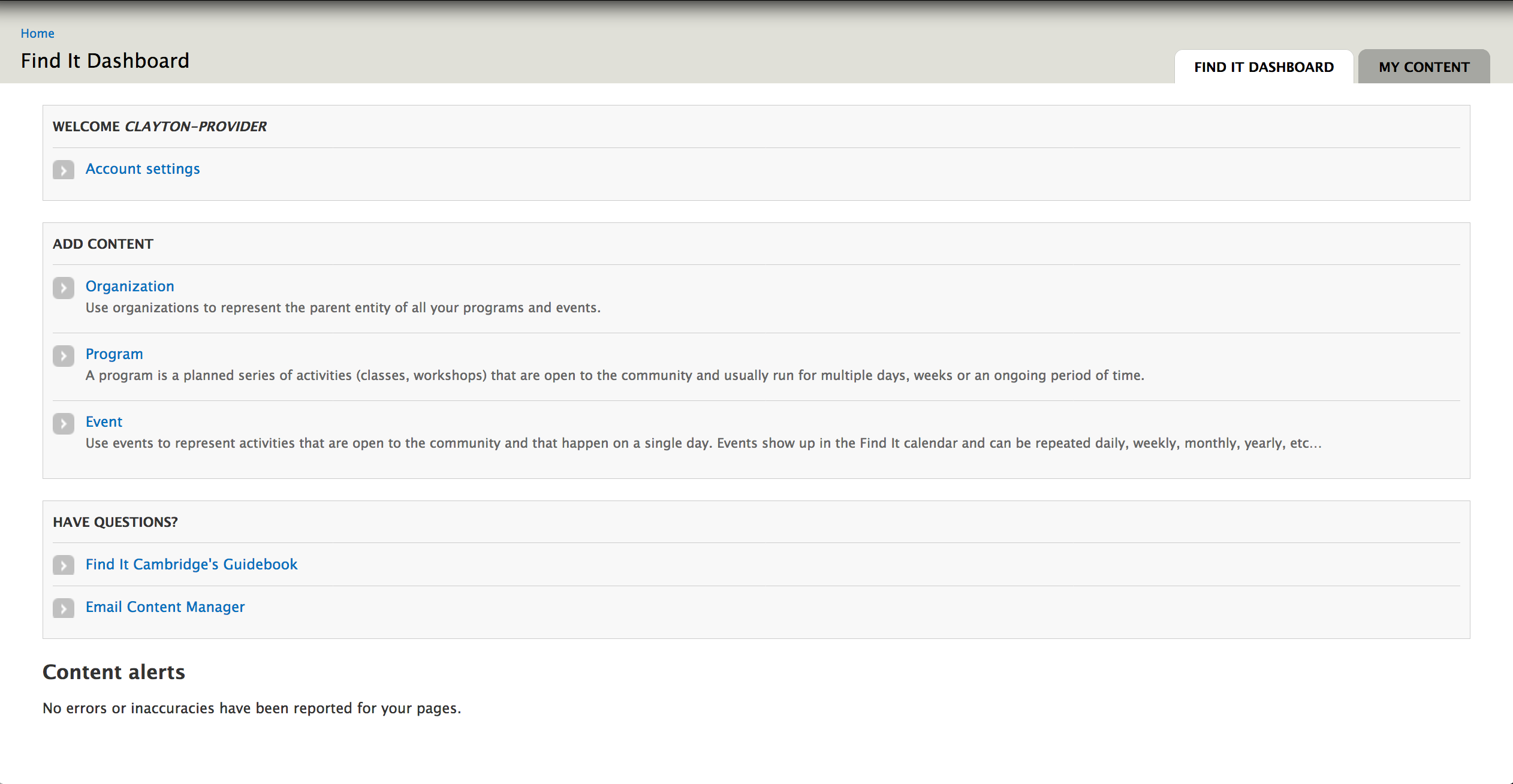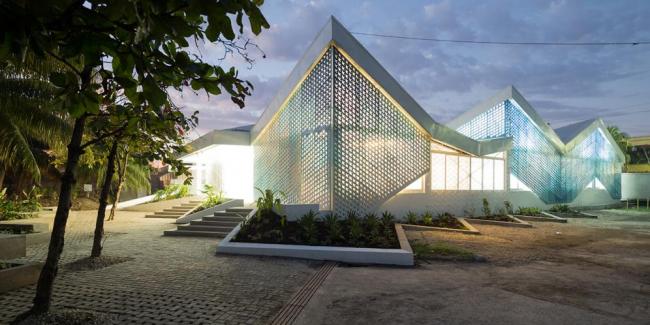
Find It Cambridge
Opportunities for those who live, work and play in Cambridge
Find It Cambridge is an online resource that empowers families, youth, and those who support them to easily find activities, services, and resources in Cambridge, Massachusetts. It serves as a one-stop-shop website for those who live and work in Cambridge.
Agaric led development and functionality-focused consulting on this project from its inception in 2016. In 2020, we upgraded the site and made the program locator and event finder platform that powers it available to all communities.
The Challenge
Building an event calendar and program directory central to people’s lives is challenging. City governments are notorious for silos and redundancy. The City of Cambridge was determined to do differently.
This started with thorough user research led by the city. Over 250 interviews and 1,250 surveys were completed by Cambridge residents and representatives from the city, schools, and community-based organizations. Taking the time to survey and interview everyday residents ensured we could confidently build a truly helpful site.
From that research we learned that the site needed:
- Powerful, but intuitive search for Cambridge residents
- Friendly authoring experience for service providers
- Phone number with a human on the other end
The Approach
To make the research findings a reality we combined forces with Terravoz, a digital research and development agency, and Todd Linkner, a designer and front-end developer who defined Find It Cambridge’s brand identity and developed an accompanying style guide.
A Search for Locals
There are hundreds of events, programs and organizations in Cambridge. To find exactly what one is looking for a sophisticated filtering system is a must. We chose Apache Solr, leader of the pack when it comes to advanced filtering.
One particularly interesting facet came out of Cambridge’s unique geography. Despite spanning a relatively small area, Cambridge’s neighborhood boundaries are infamously creative. Even longtime residents don’t necessarily know where one neighborhood ends and another starts. So, while filtering by neighborhood is helpful, we decided a visual aid was in order.
Todd Linkner created a custom SVG image file representing Cambridge’s neighborhoods. We then took that SVG file and wrote a custom module that associates each neighborhood map section to a Drupal vocabulary term. The result is a clickable map filter aiding site visitors in quickly finding programs and activities in their area.
 A clickable map allows residents to filter by neighborhood.
A clickable map allows residents to filter by neighborhood.
Supporting Service Providers
For a knowledge hub like Find It Cambridge to thrive, it needed buy in from service providers. Getting their input during the research phase set that relationship off on the right foot. The resounding feedback was that the site needed to be easy for them to use.
This proved to be a challenge because while ease of use was critical, it was also essential that events and programs have rich metadata. The more data we ask of users, the more complex interfaces become.
To address this we leveraged Drupal’s customizable dashboard and the Field Groups module.
Customized Dashboard
By default, the first page a user sees when logging into a Drupal site is an underwhelming user profile page.
We customized a dashboard with the key actions providers take on the site: creating new content, updating past content and answering questions about the site.
 A customized dashboard provides quick access to the most common tasks and information for service providers.
A customized dashboard provides quick access to the most common tasks and information for service providers.
While there is a Drupal Dashboard module, we opted to build this ourselves for maximum flexibility and control. Doing so allowed us to break information out into several working tabs. A custom administrative page for internal documentation pages and other Find It Cambridge information turns control over the “Have Questions?” section of the dashboard over to site administrators, rather than being hardcoded.
Delete Without Worries
With dozens of service providers managing content on the site mistakes are bound to happen. The worst scenario is accidentally deleting a node. In Drupal when a node is deleted it is gone forever. To protect against these we used the Killfile module to “soft delete” nodes, allowing for their recovery if needed.
Helping Managers Help Providers
Another key piece to getting relevant, timely information added to the site is helping the Find It Cambridge team remind and support service providers to use the site and update their information. To that end we put together a statistics page listing organizations in alphabetical order, along with the number of programs and events they have. This allows the team to quickly spot duplicate entries and other incorrect data.
We also implemented a notification system. Any time a service provider adds or updates content the Find It team receives an email. This helps managers stay on top of the ever changing content of the site.
Results
Since Find It Cambridge launched, 333 organizations have created accounts and contributed to the directory. Residents now have a single site they can refer to stay connected with events and access programs. The effort has also fostered increased collaboration across city departments and services.
Connecting community is an ongoing process and we continue to improve the site to better connect residents.
In 2020, we completely overhauled the site and built the program locator and event finder that powers FindItCambridge as software and as a platform available to all cities, towns, and regions to adopt.
The City of Cambridge
2017
Live (finditcambridge.org)
Benjamin Melançon, Mauricio Dinarte, and Stefan Freudenberg
Code for Boston, Terravoz, Todd Linkner Design Associates




